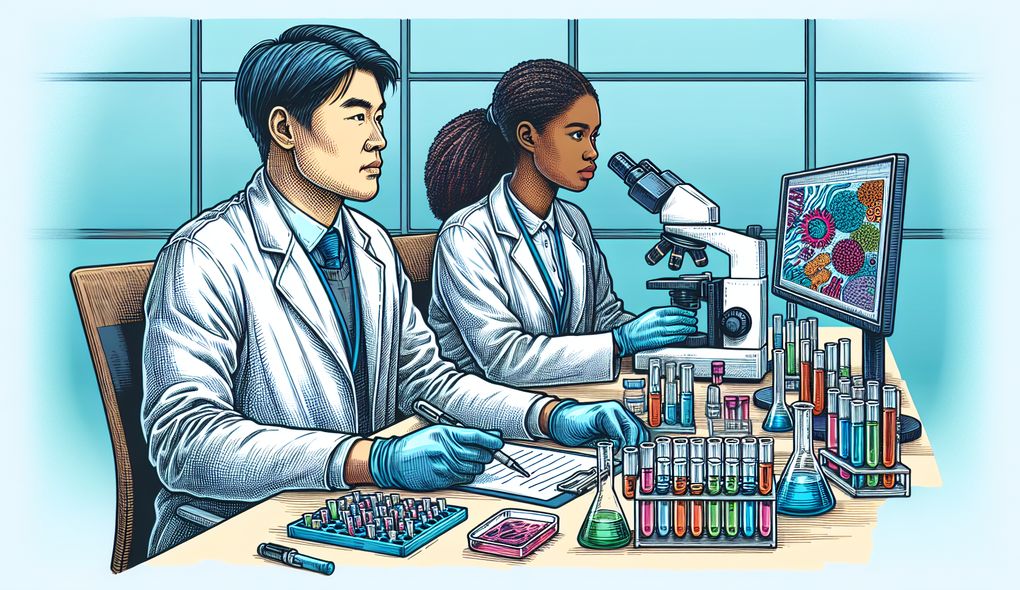How do you ensure the accuracy and reliability of laboratory instruments and equipment?
INTERMEDIATE LEVEL

Sample answer to the question:
To ensure the accuracy and reliability of laboratory instruments and equipment, I follow a systematic approach. First, I conduct regular calibration and maintenance checks on all instruments to ensure they are functioning properly. This includes checking the accuracy of measurements, verifying the calibration of temperature controls, and monitoring the performance of equipment over time. I also follow strict cleaning and sterilization procedures to prevent contamination and ensure accurate test results. Additionally, I participate in proficiency testing programs to validate the accuracy of our results and compare our lab's performance to other labs. Lastly, I stay updated with the latest advancements in laboratory techniques and equipment to incorporate them into our lab's protocols.
Here is a more solid answer:
Ensuring the accuracy and reliability of laboratory instruments and equipment is crucial in delivering accurate test results. In my experience, I have developed a systematic approach to achieve this. Firstly, I conduct regular calibration checks on all instruments, ensuring they are properly calibrated for accurate measurements. This involves using certified standards and following standardized protocols. I also perform routine maintenance checks to identify any issues and promptly address them. For example, I regularly check the temperature controls of incubators and refrigerators to ensure stability and accuracy. Additionally, I adhere to strict cleaning and sterilization procedures to prevent contamination and maintain the integrity of samples. This includes regular cleaning of instruments, surfaces, and work areas, and ensuring proper disposal of biohazardous waste. To validate the accuracy of our results, I actively participate in proficiency testing programs. This involves testing samples with known values to compare our results and evaluate our laboratory's performance. It helps identify any discrepancies and enables us to take corrective measures. Moreover, I stay up to date with the latest advancements in laboratory techniques and equipment. I actively read scientific literature, attend conferences, and engage in professional development activities to enhance my knowledge and skills. This allows me to incorporate the latest best practices into our laboratory protocols, ensuring we are using the most accurate and reliable methods.
Why is this a more solid answer?
The solid answer expands on the basic answer by providing specific examples and details to support the candidate's experience and expertise in ensuring the accuracy and reliability of laboratory instruments and equipment. It demonstrates the candidate's analytical and critical-thinking skills by explaining the systematic approach they have developed. The answer also highlights the candidate's attention to detail by discussing their adherence to standardized protocols, regular maintenance checks, and strict cleaning procedures. Furthermore, it showcases the candidate's knowledge of modern laboratory techniques and equipment by mentioning their participation in proficiency testing programs and staying updated with advancements.
An example of a exceptional answer:
Ensuring the accuracy and reliability of laboratory instruments and equipment is a critical aspect of my role as a Clinical Laboratory Technologist. To achieve this, I follow a meticulous and comprehensive approach. Firstly, I establish a robust quality control system for our laboratory. This involves implementing well-defined protocols for calibration checks, maintenance, and cleaning. I maintain thorough records of all calibration activities, including the date of calibration, the standards used, and the results obtained. By adhering to strict documentation practices, I ensure traceability and accountability. Additionally, I conduct routine performance checks on our instruments to monitor their accuracy and precision. For example, I use control samples with known values to verify the accuracy of our measurements. This proactive approach allows me to identify any potential issues early on and take appropriate corrective actions. I also collaborate closely with equipment manufacturers and service providers to stay updated with the latest technical advancements. This includes attending product training sessions, reviewing technical specifications, and seeking advice on troubleshooting and optimization. By leveraging these partnerships, I ensure that our laboratory is equipped with state-of-the-art instruments and that they are used to their full potential. Furthermore, I actively engage in continuous education and professional development activities. This includes attending conferences, joining professional organizations, and participating in workshops. By staying connected with the broader scientific community, I gain insights into innovative techniques and best practices. This knowledge is then applied to improve our laboratory processes and enhance the overall accuracy and reliability of our test results.
Why is this an exceptional answer?
The exceptional answer goes above and beyond by providing an even more thorough and detailed approach to ensuring the accuracy and reliability of laboratory instruments and equipment. It includes the establishment of a robust quality control system with well-defined protocols, thorough documentation practices, and routine performance checks. The answer also highlights the candidate's proactive approach by collaborating with equipment manufacturers and service providers to stay updated with technical advancements and seeking continuous education and professional development opportunities. Overall, the answer demonstrates the candidate's exceptional analytical and critical-thinking skills, attention to detail, and extensive knowledge of modern laboratory techniques and equipment.
How to prepare for this question:
- Familiarize yourself with different laboratory instruments and their functions
- Research and understand calibration processes and procedures
- Stay updated with current trends and advancements in the field of laboratory technology
- Learn about quality control systems and their implementation in laboratory settings
What are interviewers evaluating with this question?
- Analytical and critical-thinking skills
- Attention to detail
- Knowledge of modern laboratory techniques and equipment

